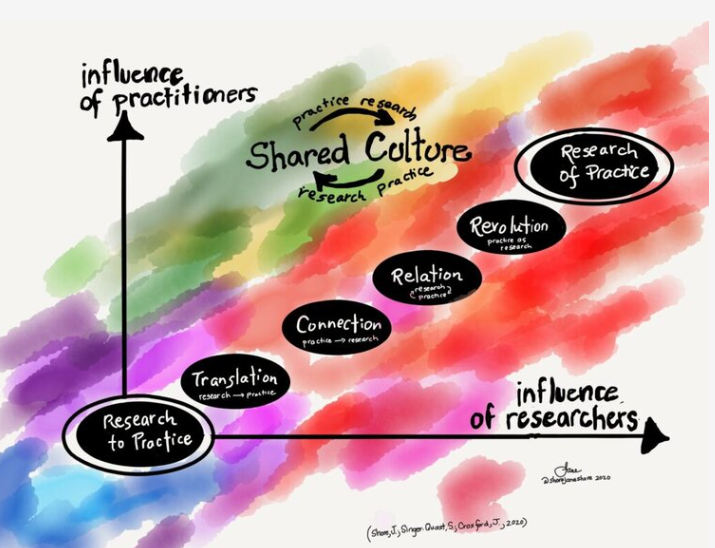Interdisciplinary Research: A Collection of Articles
The Sage Research Methods Community focus for February 2021 is on research that crosses boundaries.
Interdisciplinary research integrates concepts, frameworks, or approaches of two or more disciplines, fields of study, or professional practice. Integration is the important word in this definition. Interdisciplinary research goes beyond simply combining approaches, or bringing in experts or scholars from another field. It involves meshing or melding research approaches, theories, methodologies, and methods in order to study complex problems.
Bone, J., Emele, C. D., Abdul, A., Coghill, G., & Pang, W. (2016). The social sciences and the web: From ‘Lurking’ to interdisciplinary ‘Big Data’ research. Methodological Innovations, 9. https://doi.org/10.1177/2059799116630665
Abstract. “‘Big data’ is an area of growing research interest within sociology and numerous other disciplines. The rapid development of social media platforms and other web resources offer a vast and readily accessible repository of data associated with participants’ activities, attitudes and personal information on a scale and depth that would have previously been difficult to access without substantial resources. However, as well as offering opportunities to social researchers, this medium also presents a significant range of challenges. Ethical issues are one much debated area where social scientists are having to reassess their longstanding modus operandi, given questions regarding access to personal data and ambiguities regarding its status and legitimate usage. In addition, the scale of data accessible and the possible skills required to collect and analyse it is also a critical issue, and is an area that, arguably, has received lesser attention. In its infancy, online research could be fairly rudimentary, employing simple techniques to gather information from weblogs, forums and so on. However, the possibilities now presented by large-scale social media platforms has created the potential for more sophisticated research that often requires specialist technical expertise, involving collaborative work by computer and social scientists working together. This is a scenario that raises its own concerns, not least in terms of forging areas of shared understanding between these disparate disciplines sufficient to facilitate such projects. This article addresses such issues, providing a reflection on the theoretical and practical experience of engaging in online research, from fledgling involvement to embarking on a current collaborative interdisciplinary project. The aim is to provide some insights to other social scientists with respect to some of the potential advantages and pitfalls of web research, while a flavour of the current project, exploring Scottish Referendum and UK General Election related Twitter data, is also presented.
Erichsen, E. A., & Goldenstein, C. (2011). Fostering Collaborative and Interdisciplinary Research in Adult Education: Interactive Resource Guides and Tools. SAGE Open. https://doi.org/10.1177/2158244011403804
Abstract. The article investigates the interdisciplinary nature of research in adult education and suggests interactive research guides and other interactive resources for fostering collaboration and interdisciplinary inquiry. The purpose is to foster the development of a more functional literacy for information seeking as expressed across disciplines and the thoughtful integration of such information into academic and practical research projects within the field of adult education. Studies of researcher behavior are utilized to suggest some techniques and resources that could be employed more widely in conducting literature searches, including the creation and use of interactive resource guides. Some trends in libraries that offer promise for knowledge discovery and sharing, such as federated searching, customizable workspaces, and user-generated content, are also explored. Finally, tools and resources currently available to promote collaboration and interdisciplinary research are also noted.
Evans, E. D. (2016). Measuring Interdisciplinarity Using Text. Socius. https://doi.org/10.1177/2378023116654147
Abstract. This article presents a new, text-based measure of interdisciplinarity. The author compares the text of a scholar’s publications with text from multiple disciplines and measures the extent to which a scholar’s work integrates language from distal and proximate disciplines. The measure is tested on all faculty members employed at Stanford University between 1993 and 2008. Comparisons among text, citation, and coauthorship measures of interdisciplinarity; measures of disciplinarity; and other variables provide validity evidence for the measure. This text-based measure of interdisciplinarity offers new opportunities for data analysis, especially for unstructured text and within book-centric fields such as the humanities.
Hart, A., Biggs, S., Scott-Bottoms, S., Buttery, L., Dennis, S., Duncan, S., Ebersöhn, L., Flegg, M., Kelso, C., Khaile, N. M., Mampane, M. R., Mampane, N. S., Nash, D. J., Ngoma, R., & Theron, L. C. (2020). Negotiating Leadership in Interdisciplinary Co-Productive Research: A Case Study of An International Community-Based Project Between Collaborators From South Africa and the United Kingdom. SAGE Open. https://doi.org/10.1177/2158244020971598
Abstract. In the absence of empirical and conceptual considerations of the negotiation of leadership in teams doing community-based research, this article adds to the leadership literature by offering a critical reflection on positioning and collaborative teams in the context of one interdisciplinary, co-productive, cross-generational and international research project. The project focused on youth and community resilience to drought in South Africa. Fourteen co-researchers reflected on their experiences of leadership within the project, using a collectively developed questionnaire. Findings uniquely highlight wider ethical considerations when youth and novice researchers are included in research teams. A strong emphasis on cultural responsiveness was found; with local and culturally led leadership seen to positively influence both processes and outcomes. Reflections suggest collaboration may be approached as an “ethos” and aided by transformational leadership theories and methodologies. Findings may be especially relevant to research teams, funders, and ethical bodies.
Hoffman, A. J. (2022). A modest proposal to the peer review process: a collaborative and interdisciplinary approach in the assessment of scholarly communication. Research Ethics, 18(1), 84–91. https://doi.org/10.1177/17470161211051230
The purpose of the traditional peer review process (TPR) is to provide a more constructive and scientifically rigorous critical review of scholarly research that builds scientific rigor and validity within diverse academic disciplines. Peer review has received criticism as the demand for publications in a variety of competitive journals has significantly increased while the number of individuals who are both willing and qualified to conduct thorough reviews is significantly declining. The purpose of this topic piece is to examine the overall efficacy of the peer review process and provide recommendations toward a more collaborative, transparent (i.e. “open”), and interdisciplinary communication process.
Jewitt, C., van der Vlugt, M., & Hübner, F. (2021). Sensoria: An exploratory interdisciplinary framework for researching multimodal & sensory experiences. Methodological Innovations, 14(3). https://doi.org/10.1177/20597991211051446
Abstract. This paper describes the development and salience of an original and innovative interdisciplinary approach, Sensoria, that combines methods and techniques from social science and performance to address the methodological challenges of researching sensory/multimodal experiences. It sets out the core components and methodological principles that underpin the approach and uses an illustrative example to show how it can facilitate research on hard to access sensorial experiences, to access, understand and analyse people’s experiences and perspectives of touch, a highly tacit sensory mode. The paper discusses the methodological contribution and challenges of this approach to sensory research for social science and artistic practice and ‘more-than-representational’ research more generally. It concludes by making a case for more critical research spaces at the intersection of these disciplines to foster multi-dimensional research dialogues and to advance the exploration and understanding of the relationship between the sensory, social and the digital.
MacCleave, A. (2006). Incommensurability in Cross-Disciplinary Research: A Call for Cultural Negotiation. International Journal of Qualitative Methods, 40–54. https://doi.org/10.1177/160940690600500208
Abstract. What happens when a clinical psychologist, a grounded theorist, an ethnographer, and a phenomenologist meet to collaborate on an interdisciplinary grant proposal on childhood loneliness? Excerpts of an imaginary dialogue reveal how different disciplines can be thought of as different “cultures,” because each has its own way of doing things, deeply embedded assumptions about knowledge and the construction/representation of reality, and different specialized languages. Some of these differences might be incommensurable and call for cultural negotiation if a coherent approach is to be adopted. Cultural negotiation helps to make differences more accessible and understandable rather than creating inflexible or polarized ideological camps. This process might help methodologists think about researching across disciplines in new and more effective ways.
Trussell, D. E., Paterson, S., Hebblethwaite, S., Xing, T. M. K., & Evans, M. (2017). Negotiating the Complexities and Risks of Interdisciplinary Qualitative Research. International Journal of Qualitative Methods. https://doi.org/10.1177/1609406917711351
Abstract. This article interrogates the experiences of an interdisciplinary research team that engaged in a qualitative research program for over 5 years, beginning with the grant writing process through to knowledge dissemination. We highlight the challenges of constructing shared understanding and developing research synergies, embracing vulnerability and discomfort to advance knowledge, and negotiating risks of legitimacy and transcending disciplinary boundaries. Based on critical reflections from the research team, the findings call attention to the politics of knowledge production, the internal and external obstacles, and the open mindedness and emotional sensitivity necessary for interdisciplinary qualitative research. Emphasis is placed on relational and structural processes and mechanisms to negotiate these challenges and the potential for interdisciplinary research to enhance the significance of scholarly work.













The Director and Assistant Director of the Bass Connections program at Duke University share lessons learned and open access resources for team success in interdisciplinary collaborative research.